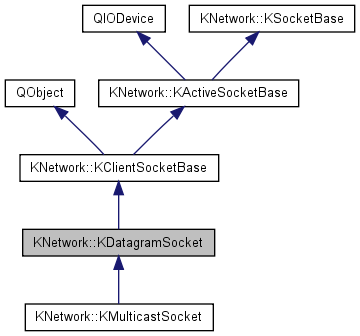KDECore
KNetwork::KDatagramSocket Class Reference
A socket that operates on datagrams. More...
#include <kdatagramsocket.h>

Public Member Functions | |
| virtual bool | bind (const KResolverEntry &entry) |
| virtual bool | bind (const QString &node=QString::null, const QString &service=QString::null) |
| virtual bool | connect (const KResolverEntry &entry) |
| virtual bool | connect (const QString &node=QString::null, const QString &service=QString::null) |
| KDatagramSocket (QObject *parent=0L, const char *name=0L) | |
| virtual KDatagramPacket | receive () |
| virtual Q_LONG | send (const KDatagramPacket &packet) |
| virtual Q_LONG | writeBlock (const char *data, Q_ULONG len, const KSocketAddress &to) |
| virtual | ~KDatagramSocket () |
Detailed Description
A socket that operates on datagrams.Unlike KStreamSocket, which operates on a connection-based stream socket (generally TCP), this class and its descendants operates on datagrams, which are normally connectionless.
This class in specific provides easy access to the system's connectionless SOCK_DGRAM sockets.
Definition at line 180 of file kdatagramsocket.h.
Constructor & Destructor Documentation
| KDatagramSocket::KDatagramSocket | ( | QObject * | parent = 0L, |
|
| const char * | name = 0L | |||
| ) |
| KDatagramSocket::~KDatagramSocket | ( | ) | [virtual] |
Member Function Documentation
| virtual bool KNetwork::KDatagramSocket::bind | ( | const KResolverEntry & | entry | ) | [inline, virtual] |
This is an overloaded member function, provided for convenience. It differs from the above function only in what argument(s) it accepts. Binds this socket to the given address.
Reimplemented from KNetwork::KClientSocketBase.
Definition at line 215 of file kdatagramsocket.h.
| bool KDatagramSocket::bind | ( | const QString & | node = QString::null, |
|
| const QString & | service = QString::null | |||
| ) | [virtual] |
Performs host lookups.
Binds this socket to the given address. If the socket is blocking, the socket will be bound when this function returns.
Note that binding a socket is not necessary to be able to send datagrams. Some protocol families will use anonymous source addresses, while others will allocate an address automatically.
Implements KNetwork::KClientSocketBase.
Definition at line 69 of file kdatagramsocket.cpp.
| virtual bool KNetwork::KDatagramSocket::connect | ( | const KResolverEntry & | entry | ) | [inline, virtual] |
This is an overloaded member function, provided for convenience. It differs from the above function only in what argument(s) it accepts. "Connects" this socket to the given address.
Reimplemented from KNetwork::KClientSocketBase.
Definition at line 237 of file kdatagramsocket.h.
| bool KDatagramSocket::connect | ( | const QString & | node = QString::null, |
|
| const QString & | service = QString::null | |||
| ) | [virtual] |
"Connects" this socket to the given address.
Note that connecting a datagram socket normally does not establish a permanent connection with the peer nor normally returns an error in case of failure.
Connecting means only to designate the given address as the default destination address for datagrams sent without destination addresses ( writeBlock(const char *, Q_ULONG) ).
- Note:
- Calling connect will not cause the socket to be bound. You have to call bind explicitly.
Implements KNetwork::KClientSocketBase.
Definition at line 92 of file kdatagramsocket.cpp.
| KDatagramPacket KDatagramSocket::receive | ( | ) | [virtual] |
Receives one datagram from the stream.
The reading process is guaranteed to be atomical and not lose data from the packet.
If nothing could be read, a null object will be returned.
Definition at line 134 of file kdatagramsocket.cpp.
| Q_LONG KDatagramSocket::send | ( | const KDatagramPacket & | packet | ) | [virtual] |
Sends one datagram into the stream.
The destination address must be set if this socket has not been connected (see connect).
The data in this packet will be sent only in one single datagram. If the system cannot send it like that, this function will fail. So, please take into consideration the datagram size limits.
- Returns:
- the number of bytes written or -1 in case of error.
Definition at line 168 of file kdatagramsocket.cpp.
| Q_LONG KDatagramSocket::writeBlock | ( | const char * | data, | |
| Q_ULONG | len, | |||
| const KSocketAddress & | to | |||
| ) | [virtual] |
Writes data to the socket.
Reimplemented from KClientSocketBase.
Reimplemented from KNetwork::KClientSocketBase.
Definition at line 173 of file kdatagramsocket.cpp.
The documentation for this class was generated from the following files:
 KDE 3.5 API Reference
KDE 3.5 API Reference